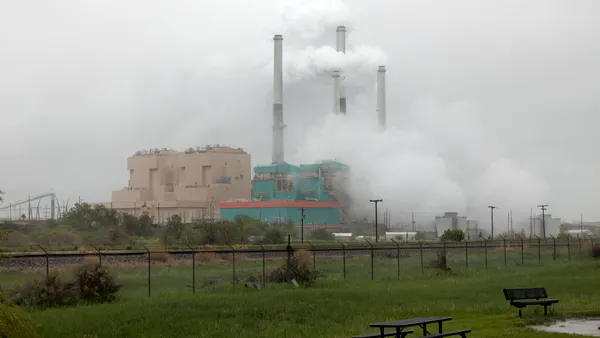Dive Brief:
-
If FirstEnergy Solutions and Exelon follow through on plans to close a total of four nuclear power plants in Ohio and Pennsylvania, it would harm the environment and result in significantly higher electricity prices for consumers, according to a report by The Brattle Group.
-
The closures would likely result in an annual increase of more than 20 million metric tons of carbon dioxide emissions and tens of thousands of tons of incremental air pollutants, according to the report, which Brattle prepared for the advocacy group Nuclear Matters.
-
The closures would also increase annual electricity costs by as much as $400 million annually for Ohio residents and $285 million for Pennsylvanians, the report found.
Dive Insight:
FirstEnergy Solutions (FES) has become the latest lightning rod in the battle over nuclear power subsidies.
The FirstEnergy subsidiary has been lobbying for some form of support for its nuclear plants for years. States such as Illinois, New York, Connecticut and, most recently, New Jersey all have passed some form of zero emission credit (ZEC) subsidy program that pays nuclear generators for their emissions-free electricity. But FES has not had success in Ohio and Pennsylvania, where its nuclear plants operate, and is now trying to win support from the Department of Energy under section 202c, a little used provision of the Federal Power Act. Section 202c orders are designed to keep plants running after natural disasters or other unexpected grid conditions.
In the wake of its request to the DOE, FES also filed for Chapter 11 bankruptcy court protection. The economically challenged nuclear plants account for about 6% of the electricity generated by FES.
Absent some form of subsidy FES said it plans to close its 908 MW Davis-Besse nuclear plant in Oak Harbor, Ohio, in 2020; its 1,268 MW Perry nuclear station in Perry, Ohio, in 2021; and its 1,872 MW Beaver Valley station in Shippingport, Pa., in 2021.
Exelon last summer said it plans to close its Three Mile Island nuclear plant in 2019 because of “severe economic challenges.”
In the report, Brattle analysts Mark Berkman and Dean Murphy said the closure of the nuclear plants would reverse the environmental benefits of all the wind and solar resources developed in the PJM Interconnection region over the past 25 years. At the current growth rate of renewable resources, it would take another 15 years to replace the zero emission output of the four nuclear plants, the analysts calculate.
In addition, Berkman and Murphy estimate that removing the nuclear plants from the market would raise power prices in Ohio by up to $2.43/MWh and in Pennsylvania by up to $1.77/MWh. Their estimates of cost impacts do not take into account the potential costs to consumers of a potential nuclear subsidy.
“I’m not aware of an explicit proposal, so I don’t know what the ZEC cost would be,” Murphy said in an email to Utility Dive. “The electricity price effect and resulting customer savings from keeping the plants that we report is [the] gross [amount]; you would need to deduct ZEC cost from this to see the net cost effect on customers,” he wrote.
Under Illinois’ ZEC program, two Exelon nuclear plants will receive customer-funded payments of $235 million a year for 10 years.
Meanwhile, the American Petroleum Institute on April 13 sent a letter to President Donald Trump urging opposition to the use of section 202c to support nuclear plants. Granting such a request “would be at odds with your stated goals of energy dominance, economic growth, and improving America’s infrastructure,” Jack Gerard, API president and CEO, said in the letter. Granting emergency relief to the nuclear plants would undermine the operation of competitive markets, he said.
Sounding the same theme, the Electric Power Supply Association on April 13 also sent a letter to Trump, arguing that a 202c intervention would be equivalent to placing “a thumb on the scale” and would “needlessly raise electricity costs by billions of dollars annually.”
In a rare alignment of interests, the Sierra Club is taking the same side in this battle as API. In late March Mary Anne Hitt, director of Sierra Club’s Beyond Coal campaign, said that the environmental group would “challenge and defeat the administration in court,” if it were to bailout FES’ nuclear plants.














